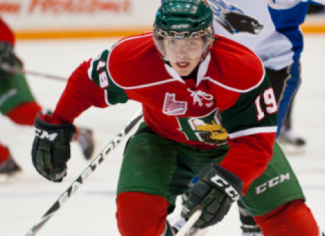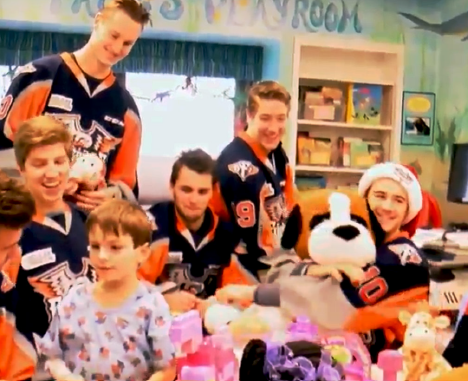BENCH STRENGTH
Junior hockey players press owners for decent treatment

17-year-old Ryan Falkenham led Halifax Mooseheads to 2013 Memorial Cup win. One year later a hip injury ended his dream of playing in the NHL
GETTING A CHANCE TO PLAY JUST DOESN'T CUT IT. The teenage players on the 60 teams in the Canadian Hockey League (CHL) believe they deserve more. The team owners don’t agree. More and more players are acting to change that.
Action by players includes an ongoing class action for back pay and a drive to form a players association. The class action seeks $180 million in compensation from team owners for failing to pay players the minimum wage.
CHL team owners insist that any attempt to fundamentally change the way its players are compensated would bankrupt most of them and cripple the leagues. They recently convinced the B.C. government to exempt the province’s six major-junior hockey teams from minimum-wage laws. Nova Scotia changed its laws in July 2016 to allow athletes to be paid less than minimum wage, and to be made exempt from regulations on vacation pay and defined work hours.
The CHL is anything but bush league. It is the world’s largest development hockey league with 52 Canadian and eight American teams playing in three major junior hockey leagues. More than 9,000,000 fans go to CHL games in any given season. Junior hockey ticket revenues are in the $160-million range. But the players gain little or nothing from any of it.
Substandard pay and benefits
The working conditions for these 16-20 year-olds would not be accepted in any other workplace. The players get just $35 to $120 per week to cover practice, training, game and travel time. But the owners call it a “stipend” not a wage or salary. They do this to maintain the myth that the players are “amateur student athletes”—not workers.
The players also receive a university scholarship—but there is a huge catch. Players only have 18 months from the end of their junior career to use the scholarship, or it expires. It also expires if the player signs any sort of professional contract.
Also, the second the player signs a contract to play junior hockey, they are no longer eligible to pursue a hockey scholarship in the U.S.
This is all in the context of what is undoubtedly an incredibly dangerous workplace. As the NHL concussion lawsuits (and common sense) highlight, hockey is a dangerous sport. Many junior players suffer severe and permanent injuries as teenagers, which impact the rest of their lives. Also, the conditions in junior hockey are ripe for players to develop significant mental health issues leading to drug and substance abuse problems.
Team medical plans are notoriously inadequate to non-existent.
Drive for collective action
A 2012 drive to form a players association in the CHL is alive and well. It gained momentum in 2014 with the official support of Unifor, Canada’s largest private sector union. The CHLPA website keeps a very close watch on the CHL and all it’s manoeuvres to avoid its responsibilities to its players—building toward the day when the players can come together to form a union.
Team owners count on individual self-interest, in what is a cut-throat high stakes gamble to hit the big time, to forever hold off that day of collective action. But even that may not be enough—as the Flint Firebirds found out in November 2015 when the team owner abruptly fired the entire coaching staff.

The team had just won a big game in overtime. It didn’t matter. The coaches were gone. The owner felt they had not given his son, a rookie on the team, enough ice time. The players couldn’t believe it and were not about to stand for it.
Every player on the team marched to the owner’s office, took off his jersey, threw it on the floor, and quit the team. Even the owner’s son stood in solidarity with his teammates and told his father he quit.
This turned into a social media disaster for the Flint Firebirds, as word quickly spread celebrating the players’ actions and condemning the owner’s rash decision. The team had to disable its Facebook page because of all the negative comments the story generated.
The owner immediately back-peddled, rehired the coaches and apologized, admitting he made a mistake.
This was an impressive and brave move on the part of the players. It serves as a reminder that collective action in pursuit of simple justice is something that can spring up any time and in any workplace—even when it’s a hockey rink.











Add new comment